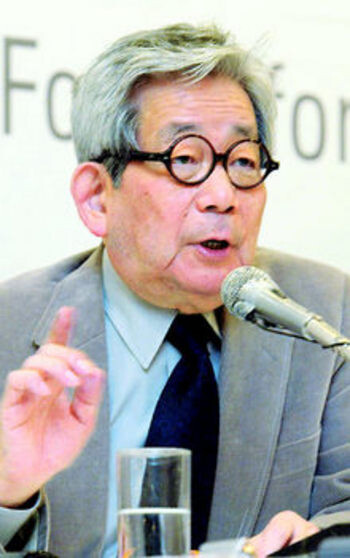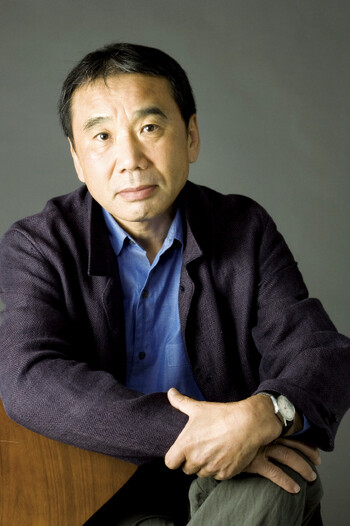hankyoreh
Links to other country sites 다른 나라 사이트 링크
Japanese intellectuals ask that Japan earnestly reflect on its history

By Jeong Nam-ku, Tokyo correspondent
Japanese intellectuals issued an appeal to the public calling for self-reflection by Japan.
The movement, which comes amid intensifying territorial conflicts in East Asia over Dokdo and the Senkaku (Diaoyu) Islands, includes such prominent figures as Nobel Prize-winning novelist Kenzaburo Oe.
Civil society leaders staged a press conference on Sept. 28 at the Members' Hall of the House of Councilors in Tokyo to call on Japan to "recognize, reflect on, and sincerely articulate its historical issues in order to break the vicious cycle of territorial conflict."
They included Atsushi Okamoto, former editor-in-chief of the leading Japanese progressive journal "Sekai (The World)"; attorney Masatoshi Uchida, a longtime figure in lawsuits claiming compensation for issues in South Korean-Japanese history; former Asahi Shimbun Seoul bureau chief Koh Odagawa; and Ken Takada, an activist with the Citizens' Association Against Revision of the Constitution. Around 800 citizens signed the appeal, including children's writer Kayoko Ikeda, military critics Tetsuo Maeda, former Nagasaki mayor Hitoshi Motoshima, and Oe.
The statement urged the Japanese public "not to forget that the backdrop for the current territorial frictions is modern Japan's history of invading Asian countries."
"Japan's annexation of Dokdo occurred during the Russo-Japanese War when Japan was trying to colonize the Korean peninsula and strip it of diplomatic rights," the statement reads.
"The people of Japan must understand that Dokdo is not simply an island to Korea, but a starting point and symbol for invasion and colonial rule."

The press conference attendees also stressed Tokyo's need to build on the Murayama Statement of 1995, acknowledging and apologizing for misdeeds during Japan's colonial rule.
"For Japan, South Korea and China are important allies and partners in building regional peace and prosperity," they said.
Takada said at the press conference that like-minded individuals hurried to draft the appeal out of concern over the situation, gathering the opinions of others who sympathized by email over a five-day period.
The participants gave a number of suggestions for reducing friction, including enacting norms of behavior to deter such conflicts in East Asia, setting up forums for dialogue and discussions toward joint development of local resources, and establishing a framework for private dialogue linking South Korea, China, Japan, Taiwan, and Okinawa.
Meanwhile, noted Japanese novelist Haruki Murakami published a column in the Sept. 28 edition of the Asahi Shimbun expressing fears that the recent territorial conflict was tearing apart an East Asian cultural sphere that took 20 years of cultural exchange to mature.
"We cannot block the path for souls to cross national borders," he wrote.
Murakami also said territorial issues were inevitable as long as national boundaries existed, but that they could be solved through practical action.
"Once territorial issues move into the sphere of 'national emotions,' it creates a dangerous situation where there is no avenue of escape," he wrote.
Please direct questions or comments to [englishhani@hani.co.kr]

Editorial・opinion
![[Editorial] Does Yoon think the Korean public is wrong? [Editorial] Does Yoon think the Korean public is wrong?](https://flexible.img.hani.co.kr/flexible/normal/500/300/imgdb/original/2024/0417/8517133419684774.jpg) [Editorial] Does Yoon think the Korean public is wrong?
[Editorial] Does Yoon think the Korean public is wrong?![[Editorial] As it bolsters its alliance with US, Japan must be accountable for past [Editorial] As it bolsters its alliance with US, Japan must be accountable for past](https://flexible.img.hani.co.kr/flexible/normal/500/300/imgdb/original/2024/0417/6817133413968321.jpg) [Editorial] As it bolsters its alliance with US, Japan must be accountable for past
[Editorial] As it bolsters its alliance with US, Japan must be accountable for past- [Guest essay] Amending the Constitution is Yoon’s key to leaving office in public’s good graces
- [Editorial] 10 years on, lessons of Sewol tragedy must never be forgotten
- [Column] A death blow to Korea’s prosecutor politics
- [Correspondent’s column] The US and the end of Japanese pacifism
- [Guest essay] How Korea turned its trainee doctors into monsters
- [Guest essay] As someone who helped forge Seoul-Moscow ties, their status today troubles me
- [Editorial] Koreans sent a loud and clear message to Yoon
- [Column] In Korea’s midterm elections, it’s time for accountability
Most viewed articles
- 1[Column] The clock is ticking for Korea’s first lady
- 2Samsung barricades office as unionized workers strike for better conditions
- 3[Editorial] When the choice is kids or career, Korea will never overcome birth rate woes
- 4[Guest essay] How Korea turned its trainee doctors into monsters
- 5Why Israel isn’t hitting Iran with immediate retaliation
- 6S. Korea, Japan reaffirm commitment to strengthening trilateral ties with US
- 7Japan officially says compensation of Korean forced laborers isn’t its responsibility
- 8[Editorial] As it bolsters its alliance with US, Japan must be accountable for past
- 9Korea, Japan jointly vow response to FX volatility as currencies tumble
- 10‘Right direction’: After judgment day from voters, Yoon shrugs off calls for change